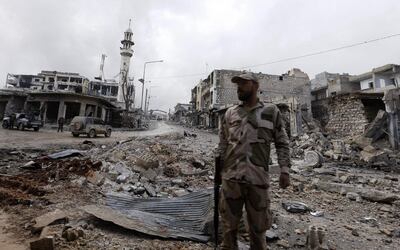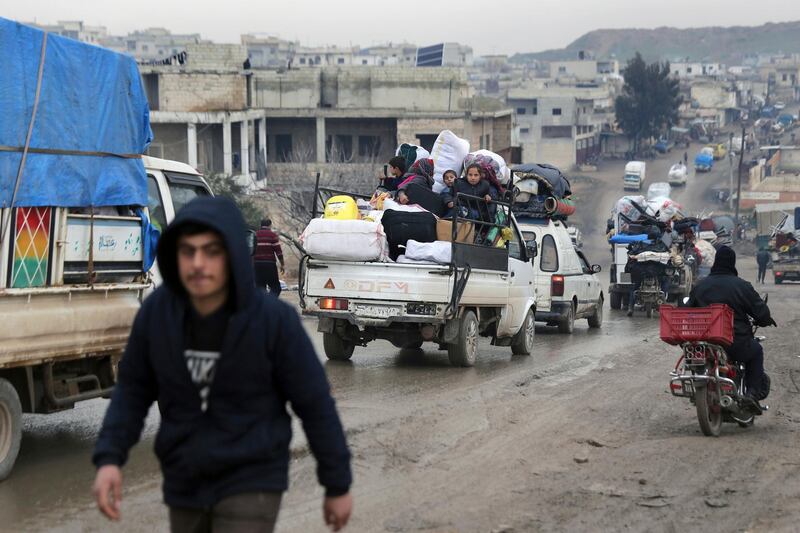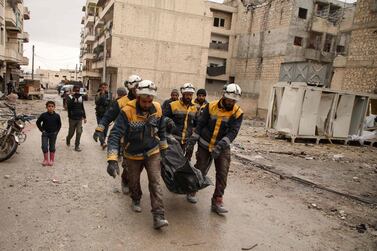The lines of cars, lorries and tractors stretched for kilometres along roads leading north to the border with Turkey this past week as Syrian civilians fled advancing government forces in Idlib province.
“Every day, you see the cars coming — lines of them reaching back maybe tens of kilometres. The main street here is filled with perhaps three lanes of cars coming from the south,” said Abu Ibrahim, a teacher and relief worker in the town of Sarmada.
The arid, hilly landscape along Syria’s north-western border with Turkey is dotted with blue blotches of tent cities that already house thousands of Syrians displaced by the Russian-backed government offensive to reclaim the last region in rebel hands after nearly 10 years of civil war.
Abu Ibrahim and his family fled here last year from their home in Hama province, just south of Idlib, as government forces fought their way north.
Now he works to help new arrivals, whose numbers have grown to tens of thousands after pro-government forces advances in recent days, including the capture of the key town of Maaret Al Numan in southern Idlib.
“This time, the displacement is the largest,” Abu Ibrahim said.
But the resources to help them are already stretched.
Sarmada "can maybe hold 10,000 families and it’s already many times over that number”, he said.
“People can no longer find shelter in the town, let alone a house, uncovered building or even a room. Even the camps are full.”
Local monitoring groups estimate that as many as 60,000 people have fled their homes in rebel-held areas of Aleppo and Idlib provinces since the beginning of the week.
Nearly 390,000 have been displaced across the north-west since December, according to the United Nations, with the latest displacements “severely exacerbating shelter and accommodation shortages across north-west Syria”.
Families find shelter where they can – in mosques, unfinished buildings or schools – with thousands relying on local charities to get by.
Even those lucky enough to find rented accommodation are unsure about what the immediate future holds.
Abdu, whose asked that his full name be withheld, said he and his family fled to the border area from Maaret Al Dibseh about three weeks ago as pro-government forces closed in on Maaret Al Numan.
“Some civilians started to flee at the beginning of the year, even though the bombing hadn’t started yet. The whole area was in panic,” he said.

Abdu fled when the bombing escalated. Syrian army units reportedly overran Maaret Al Dibseh on Wednesday night.
Abdu’s family have found displacement to be expensive. Some relatives who fled before them rented a room in an apartment, but Abdu says their money is running out fast.
“We’re not comfortable here,” he said. “Plus we’re afraid that the regime will continue to advance.”
“If that happened, where would we go?”
It is a question that hangs over the estimated hundreds of thousands of displaced Syrians who have fled to the Turkish border since the government and its allies launched an offensive in Idlib last April.
Syria’s north-west is both home and refuge for at least four million people – local residents who have weathered years of war in the rebel-held territory as well as countless Syrians displaced from other areas of the country.
Many observers expected the April offensive to be a limited campaign – either to rein in front-line attacks by hardline Islamist groups or to secure two strategic highways, the M4 and M5, that run through opposition territory.
But the fighting has continued despite the ceasefire agreement brokered in September 2018 between Russia and Turkey, which supports some rebel groups in Idlib, and a number of shorter attempted ceasefires since then – most recently on January 12.
Turkey is now in a difficult position. On Wednesday, President Recep Tayyip Erdogan blamed Russia for "not honouring these agreements,” adding that Ankara was losing patience with ongoing hostilities.
Turkey has closed its border crossings from Idlib, reluctant to add to the roughly 4 million Syrian refugees in the country, but recently proposed building towns on the Syrian side of the border to house the tens of thousands of civilians gathering there.
In recent years, Turkish border guards have repeatedly used lethal force to prevent Syrians from crossing over.
According to Omar Kadkoy, a policy analyst at the TEPAV think tank in Ankara, Turkey’s concerns about “protecting those who flee bombardment within the Syrian territory by erecting camps adjacent to the Turkish border” will not extend to actually allowing Syrian refugees into Turkey.
“Hundreds of thousands already reached the Turkish border and Ankara is doing its best to accommodate them in camps and distribute food items,” Mr Kadkoy said.
Since last week, the government-affiliated Humanitarian Relief Foundation (IHH) started building emergency shelters of stone and canvas in a field outside the village of Kafr Louseen. Deliveries of food and essential items have also been sent across the border.
But displaced civilians had been hoping for more from Ankara as government forces press onwards not only from the south but from Aleppo to the east.
“People who’ve been displaced are scared that the regime is going to take back this area,” said Abu Ibrahim. “There’s been no response from Turkey, no political statement, no action on the ground.”
Even in the relative safety of the border area, “people in the camps are scared”, he said.






